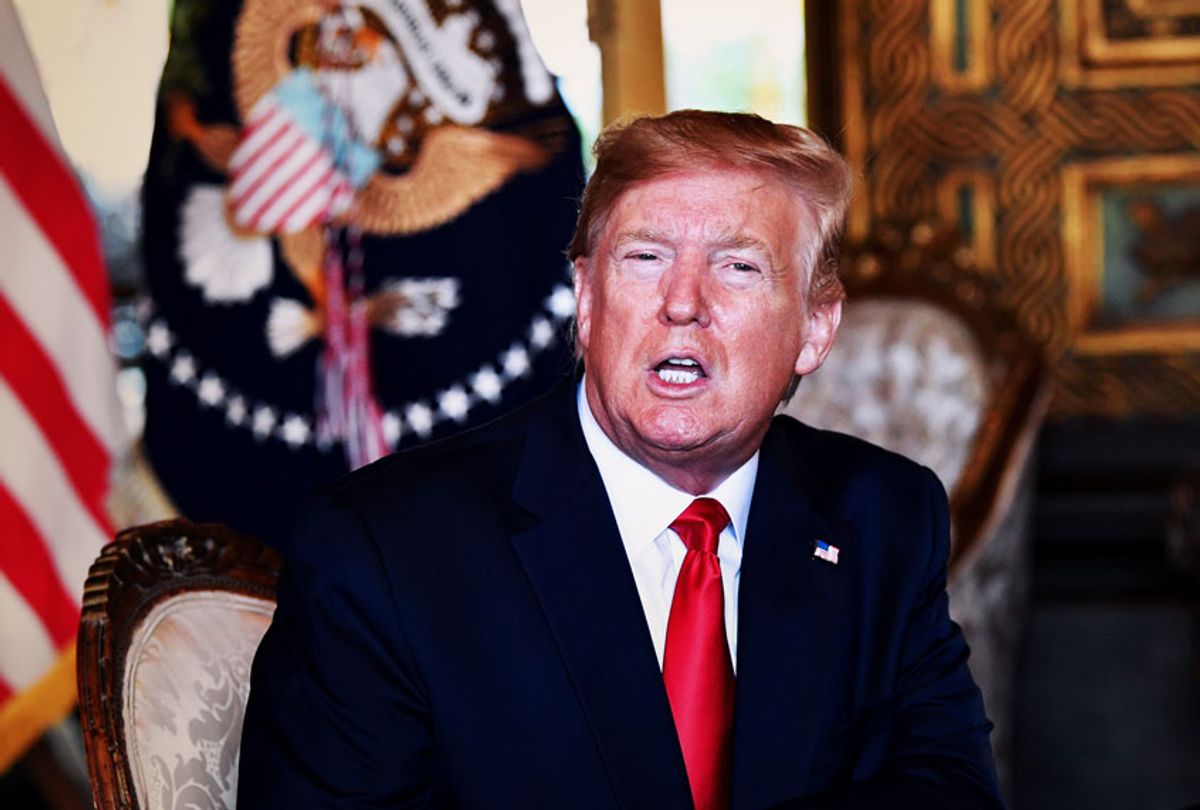President Donald Trump was accused of "jury tampering" after he reportedly threatened Republican senators not to vote to remove him from office in his impeachment trial.
A Trump confidant told CBS News that Republican senators were warned: "Vote against the president, and your head will be on a pike."
Trump, who has been repeatedly accused of witness tampering in the impeachment probe, former special counsel Bob Mueller's investigation and more, was also accused of trying to "bribe" vulnerable Republican senators with big-money fundraising appeals ahead of the trial.
And Trump's efforts to shore up support from Senate jurors ahead of the vote on whether to remove him from office seem fall under the definition of jury tampering.
Jury tampering is defined as "attempting to influence a jury through any means other than presenting evidence and argument in court, such as conversations about the case outside the court, offering bribes, making threats or asking acquaintances to exert their influence on a juror" according to Nolo's Plain-English Law Dictionary.
Former FBI Assistant Director Frank Figliuzzi agreed that Trump's reported threat could be a violation of federal "jury tampering" statutes.
Former Rep. Tom Coleman, R-Mo., said the comment was "clearly" an example of tampering and called for the matter to be taken up by Supreme Court Chief Justice John Roberts.
"Jury tampering? [Jimmy] Hoffa went to jail for that," Mother Jones editor David Corn added, referring to the union boss' conviction in the 1960s.
Former White House ethics chief Walter Shaub cautioned on Twitter that the remark was "of course, a figure of speech." However, he added that "the sentiment behind it reflects the state" of the Republican Party.
"Its members aren't thinking about right or wrong, our constitutional form of government, or the American people," he wrote. "They care about ruling and all the profit they can derive from it."
Trump similarly came under fire after he rewarded vulnerable Republicans who backed him in the impeachment inquiry by raising money for them while snubbing senators like Susan Collins, R-Maine, who has been less supportive.
"This is a bribe. Any other American who offered cash to the jury before a trial would go to prison for felony bribery. But he can get away with it?" former White House ethics chief Richard Painter tweeted. "The senators can raise their own campaign cash. Any senator who accepts cash from [Trump] before the impeachment trial is guilty of accepting a bribe and should go to the slammer."
Trump's alleged efforts to keep Republicans in line, if true, appear to have worked. Every Republican voted down party lines to block 11 Democratic amendments to introduce evidence and witnesses ahead of the trial, save for one vote in which Collins voted with Democrats on an amendment to extend the amount of time House impeachment managers had to respond to motions.
Republicans like Collins and Sen. Mitt Romney, R-Utah, have said they are open to allowing witnesses during the trial, but Axios reports that Democrats "may fall short" of securing the four Republican votes they need to do so.
Sens. Cory Gardner, R-Colo., Thom Tillis, R-N.C., and Joni Ernst, R-Iowa, who are considered among the most vulnerable Republicans in this year's Senate elections and were among the beneficiaries of Trump's fundraising appeals, appear to have already ruled out voting with Democrats on witnesses, according to the report.
Senate aides are also skeptical that Democrats can convince Sen. Lamar Alexander, R-Tenn., a retiring lawmaker seen as the swing vote on the issue, to vote to allow witnesses given his close friendship with Senate Majority Leader Mitch McConnell, R-Ky., who has opposed allowing them.
And while Collins, Romney and Sen. Lisa Murkowski, R-Alaska, have said they are open to witnesses, there is no guarantee they will vote to approve the witnesses sought by Democrats.
"Just because some senators pushed to guarantee there would be a vote to witnesses if a majority supported that," a Republican Senate aide told Axios, "it doesn't mean they'll vote to hear from witnesses when the time comes."



Shares